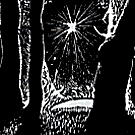| The dark age | ||
At the end of the medieval stage (fourteenth to fifteenth centuries), the most glorious period of Galician writings, the Galician language and literature entered a period of decline. There were various factors behind this gradual decline, including the arrival in our country of foreign nobility which was intransigent with the culture and language of Galicia. These people were able to substitute the Galician nobility which was defeated after supporting the losers in the dynastic battles for the crown of Castle, first Pedro I against Henry II of Trastamara and later (1475-1479) Xoana a Beltranexa against the future Isabel la Catolica; other factors were the absence of a bourgeoisie able to defend its own interests and those of the country, a drop in population, the loss of autonomy of the Galician church, etc. The growing centralist and interventionist policy of Castile gave impetus to the process of decline of Galician in the upper classes of society and prevented the consolidation of Galician as a literary language. The concept of a "national State" appeared within this centralising system alongside the need for linguistic uniformity to achieve cohesion of the new political structure. Over a long period of three centuries -the sixteenth, seventeenth and eighteenth, known as the "Seculos Escuros"- the Galician language was not used for written purposes, whereas Castilian and Portuguese became consolidated and codified, thus entering the category of languages for culture. However, Galician continued to be the normal means of communication for practically all the local population. This exclusively oral use brought with it dialectisation and fragmentation and it was thus considered an aliterary language which was of no use for science and culture. Galician literature, therefore, did not participate in the Renaissance and the Baroque periods, and its darkest period was when the Golden Age of Castilian literature overshadowed it. Nevertheless, a few letters, documents and occasional literary samples show us the language of the time. Parallel to this lack of erudite literature, popular lyricism survived in the form of cradle songs, blind ballads, carnival songs, riddles, legends, romances, stories, farses, etc., many of which have reached us through oral transmission. In the eighteenth century the so-called 'enlightened' voices expressed their concern for the under-development of Galicia and made proposals for the restructuring of economic, social and cultural life. Organisations such as the Economic Association of Friends of the Country and the Academy of Agriculture of the Kingdom of Galicia. The most outstanding figure in this minority group of intellectuals was the versatile Padre Fray Martin Sarmiento -naturist, linguist, bibliophile- who defended the use of Galician in education, the administration and in the Church, basically its use as the vernacular of the Galicians. Other members of the group were Padre Feijoo, the first to refuse to accept that Galician was a "dialect", and Padre Sobreira, who continued the lexicographic work of Sarmiento. He was the first to call attention in his works to the complex linguistic situation which was later to be seen in the second half of the nineteenth century. |
 The arrival of the "Catholic Kings" and foreign nobility led to the "Dark centuries". | |
Back | ||